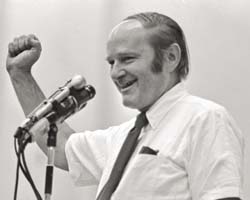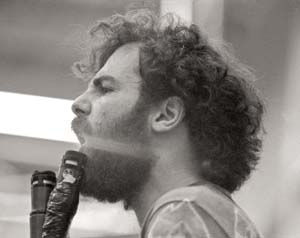 |
 |
| current issue |  | past issues |  | send a letter/news |  | address update |  | advertise |  | about us |  | alumni home |
Features
Riot ActPage: < Prev 1 2 3 4 Next >
Meanwhile, political tensions were escalating across the country in the wake of President Richard Nixon's April 30 announcement that he was sending troops into Cambodia, a move widely viewed as an expansion of the war. Even as the trustees continued their deliberations on Friday and Saturday, several thousand National Guard troops were dispatched to marshal 10,000 protesters—including some UNH students—in New Haven, Conn. There were disturbances on college campuses—at Kent State University in Ohio, for example, an ROTC building was burned down.
 David Dellinger of the Chicago Three. |
When the trustees finally adjourned after midnight on Saturday, they had approved the Chicago Three visit for Tuesday, May 5, with restrictions. The event must take place between the hours of 2 and 5 p.m., the trustees said, claiming that outside agitators might show up on campus after work if the speeches were held at night. But Hoffman, Rubin and Dellinger had legal appointments in New York, Wefers had been told, which would prevent them from arriving before 5 p.m. at the earliest.
UNH organizers had duly arranged for student marshals wearing white sashes to help control the crowd at the event, but up until this point, Wefers didn't have real concerns about safety. That changed on Monday, May 4, with news of the Kent State shootings. National Guardsmen had opened fire on a crowd of unarmed student protestors for reasons that remain unclear to this day. They fired 67 shots in 13 seconds, killing four and injuring nine students, some of whom were just walking to class. The nation was stunned. Even the apolitical could not remain unmoved.
"We were in shock," remembers Nancy Ray '74. "We had gotten used to saying some things we thought needed to be said without thinking people were really going to die."
From that moment on, Wefers knew that the possibility of violence was not to be dismissed. University and state officials were terrified, he recalls: "You could see it in their eyes." Wefers was scared, too, but he appeared in federal court that morning to seek a restraining order against the trustees' time restrictions nonetheless. The lawyer for the trustees assured U.S. District Court Judge Hugh Bownes that his office had made "inquiries"; legal hearings for the three had been postponed, and they could, indeed, arrive and speak in daylight hours. He even promised to send a member of his law firm to Logan Airport to pick them up. Bownes issued a rather vague ruling allowing the speeches to conclude only a little later, at 6:30 p.m.
 Jerry Rubin of the Chicago Three. |
Wefers didn't trust the trustees—or their lawyers. He called his office in the MUB and asked his friends to get down to Logan as soon as possible. Driving a two-tone gold Oldsmobile Toronado they had borrowed from Whittemore School dean Jan Clee, Peter Harris '69, Carolyn Beebe '72 and Scagliotti arrived at Logan at the same time as the trustees' driver. They put Hoffman, Rubin and Dellinger in the backseat and headed north. The lawyer drove home alone.
No one is clear—or no one will say, even 40 years later—who decided that the Chicago Three would flip the finger, so to speak, at the court-ordered time restrictions and spend the afternoon in Clee's Dover townhouse, leaving only to eat lobster at Newick's Restaurant. Scagliotti will never forget the green Ford, with black-suited men—FBI he was sure—who followed their car from Logan to Dover to Newick's and finally to Durham. Hoffman insisted they sit near a parking lot window at the restaurant so the men in the Ford could watch them enjoying their lobsters.
Back on campus, thousands of students crowded into the Field House, believing the Chicago Three would speak at 3:30 in what was now billed as a student strike rally, as part of a national movement in response to the Cambodia invasion. The crowd stayed in the Field House at Wefers' urging, after he read a note from the speakers, which concluded: "There's no such thing as half a free speech. See you tonight."
Headquartered in the Field House coaches' office were McConnell, Attorney General Warren Rudman (later to be a U.S. senator), and Fred Hall Jr. '41, chairman of the trustees. McConnell mildly told the press he continued to consider the event "unadvisable," but had decided to let it go forward. Rudman said he endorsed McConnell's decision, but then alluded to the late arrival of the speakers: "We have seen the depths of deceitful conduct this afternoon. And it will be dealt with." Peter Riviere '71, editor of The New Hampshire at the time, says Rudman also told him to get a message to his friend Wefers: "Tell him to get a lawyer."
Riviere left the office shaken, noting that the Field House was "crawling" with state police. He was convinced the campus was under martial law. He didn't yet know about the National Guard units, under Rudman's command, stationed in nearby Newmarket.
Page: < Prev 1 2 3 4 Next >
Easy to print version

